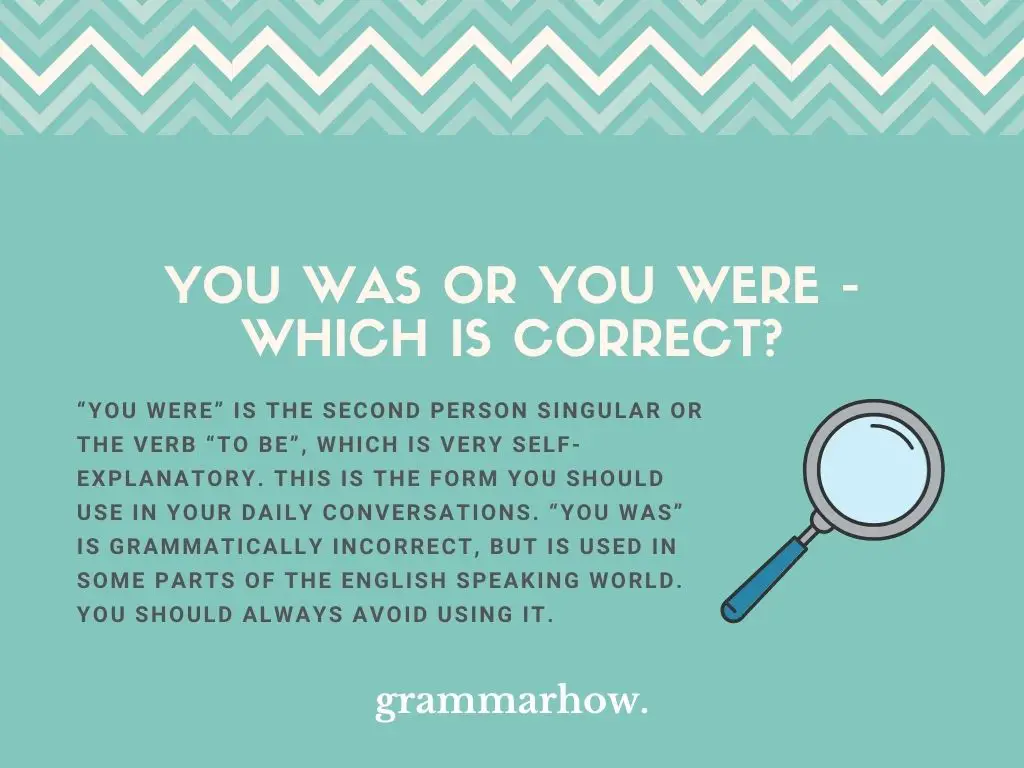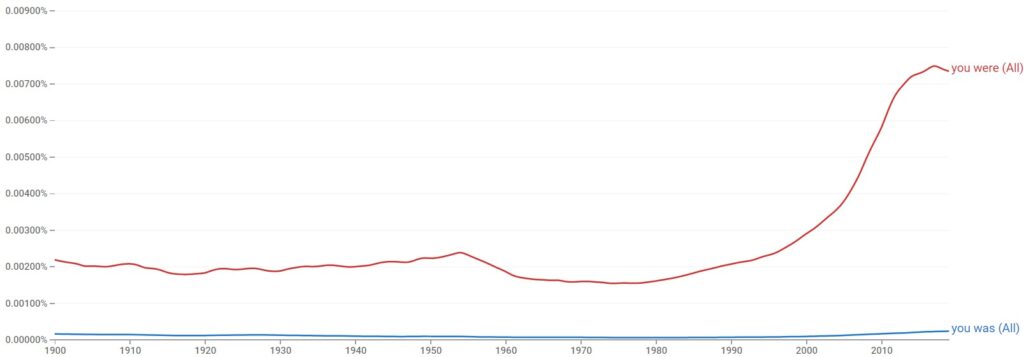What’s the correct form: “You Was” or “You Were”? This is a grammar based question, that may sound simple to many. However, there’s also some confusion out there.
So, let’s take the opportunity to look into those forms, and understand how they work, what’s correct and what we should avoid.
You Was or You Were – Which Is Correct?
“You Were” is the second person singular or the verb “to be”, which is very self-explanatory. This is the form you should use in your daily conversations. “You Was” is grammatically incorrect, but is used in some parts of the English speaking world. You should always avoid using it.

Take a look at the example:
- You was so cute as a kid. (incorrect)
- You were so cute as a kid.
Trying to use “You Was” even sounds strange. Have you tried reading the sentences out loud? It sounds off, to anyone who speaks English.
Although it might be used by some, in some sort of exception scenario, you should avoid it. That’s valid especially if you’re a non-native speaker, because people will likely start to try and correct you – and that can be a very awkward situation.
You Was
“You Was” is incorrect. It’s a wrong form for the second person singular of the verb “To be”, and you shouldn’t ever try to use it.
Let’s look at some examples of the wrong form “You Was”, followed by the corrected versions of the same sentences:
- You was very sad yesterday. (incorrect)
- You were very sad yesterday.
- You was very important to me, when we were kids. (incorrect)
- You were very important to me, when we were kids.
- I wish you was around more often. (incorrect)
- I wish you were around more often.
“You Was” used to be considered acceptable centuries ago, and is seen in literary work as late as the 1800’s. Some people have also shared that it’s still heard in very remote areas, especially in England’s countryside.
However, the fact that it was used in the past or that remote villages somewhere still eventually use the “You Was” form doesn’t make it correct, and that’s why we shouldn’t use it. If you speak like people might just assume you have poor English skills, and no one wants that.
You Were
“You Were” is the grammatically correct form for the second person singular of the verb “to be”. There’s not much to explain here, except to say this is the rule, and we all should follow it.
Take a look at some examples:
- You were my best friend for years.
- I wish you and I were there.
- Why were you not at the party last night?
- You were listening to this song when we first met.
- You were so amazing at your gig yesterday!
The verb “to be” in all of its forms is so common and used so frequently, that for anyone who speaks English its use is very much ingrained.
That’s why we say that the form “You Were” as the second person singular of the verb “to be” is very much self explanatory: for anyone who speaks English, “You Were” is simply the form you’d go to, without really having to think about it.
Which Is Used the Most?
Are you curious to find out which one of the two forms is used more often? Then, take a look at the graph from Google Ngram Viewer below.

As expected, “You Were” appears much more often than “You Was”. It’s the correct form, grammatically acceptable, and it only makes sense that it’d be the one mostly used by people all around.
However, as we’ve mentioned before, the fact that a form is incorrect doesn’t necessarily prevent people from using it. Consequently, “You Was” appears a little bit, on some occasions.
Keep in mind that you should avoid using that form, or you may sound like a bad speaker of the language (regardless of being a native or not).
Final Thoughts
It’s quite simple: “You Were” is the correct form we should all use, while “You Was” is grammatically incorrect and should be avoided. “You Were” is the second person singular of the verb “to be” and is used quite frequently. Always avoid “You Was”.

Martin holds a Master’s degree in Finance and International Business. He has six years of experience in professional communication with clients, executives, and colleagues. Furthermore, he has teaching experience from Aarhus University. Martin has been featured as an expert in communication and teaching on Forbes and Shopify. Read more about Martin here.
